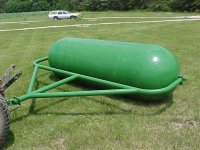BigAl
Platinum Member
- Joined
- Dec 6, 2003
- Messages
- 579
- Tractor
- Kioti DK45TLB
I had the same problem with the old gas company I used . I called many times to pick up the tank , and they just blew me off /forums/images/graemlins/confused.gif. I guess they were limited on space and wanted me to store it until they needed it . Anyway , One day I just used the tractor and hauled it out on to the county road "right of way" and then called them and told them they might want to pick up their tank before it created a accident and they got sued, big time ! /forums/images/graemlins/smirk.gif . Oh boy ! They were not happy campers /forums/images/graemlins/mad.gif.The tank was gone in two hours . I somehow had forget to mention to them it was not any where near the main road ,just on the county right of way /forums/images/graemlins/blush.gif .Hee Hee
